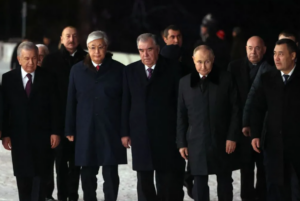Not One Woman on the List
Originally published by Pat Mitchell for Ms. Magazine
Earlier this month, Azerbaijan President Ilham Aliyev announced the organizing committee for COP29, which will be held there in November. The list included 28 appointees, including Azeri government ministers of energy, health, finance and economy, among others.
What the list did not include: women.
Not one woman on the list.
The backlash was swift and thunderous. Many women (and men) leaders reacted on social media, including Christiana Figueres, who oversaw the 2015 Paris Agreement as the COP president that year, calling the all-male panel “shocking and unacceptable.”
“Climate change affects the whole world, not half of it.”— Elise Buckle, She Changes Climate
In an open letter, She Changes Climate called on the COP29 Presidency to urgently amend the list, noting that the “UAE set the pace last year: The COP Committee consisted of 63 percent women.”
“These nominations mean that the gender gap in global climate leadership has widened (only five women in 29 years of COP have served as president). This is a regressive step in the journey towards gender parity in climate; but there is still time for change.”— She Changes Climate
In an open letter organized by the We Mean Business Coalition, 75 global women leaders spoke out, saying in part:
“Gender diversity is crucial to successful negotiations and decision-making, bringing with it better, bolder decisions that have been shown to last.
“Many of the key successes of the COP process, including the Paris Agreement, were delivered by women leaders, working closely with their male colleagues. In the private sector, many of the leading voices for transformational action on climate are coming from women executives. Around the world, in every sector and industry new climate related jobs are being created and many are being filled with exceptionally talented women at every level.”—We Mean Business Coalition
Another open letter from The B Team, led by CEO Halla Tómasdóttir, also recognized “the urgency of inclusive decision-making for effective solutions.”
We need women leaders at all levels of decision-making to chair and drive COP29. When women are at the table, we achieve better results. Besides being 50 percent of the population (which is reason enough), studies of peace negotiations have shown that having more women at the table results in a shift in the dynamics of the conversation and a broadening of the issues under discussion. Better representation in negotiations leads to more emphasis on addressing root causes, increased consideration of community perspectives, and greater pressure on the parties to reach an agreement or go back to the negotiating table when talks falter.
Dr. Robert Rohde, lead scientist at Berkeley Earth, noted on Twitter/X that the Azeri president’s list wasn’t really all that surprising, given that “gender equality is not exactly Azerbaijan’s strength.” He pointed out that only two members of President Aliyev’s Cabinet are women: the vice president (who is also his wife) and the chair for family, women and children affairs.
The news of the list was broken by Guardian environment editor Damien Carrington. Kudos to Carrington for his coverage, which spurred more articles in other media outlets around the world, increasing the pressure on the COP29 Presidency to fix the problem.
A few days later, the Azeri president added 12 women (and one man) to the list, including Azerbaijan’s deputy minister for ecology and natural resources, Umayra Taghiyeva; the chair of the state committee on family, women and children affairs, Bahar Muradova; and its human rights commissioner, Sabina Aliyeva. See the updated list here.
